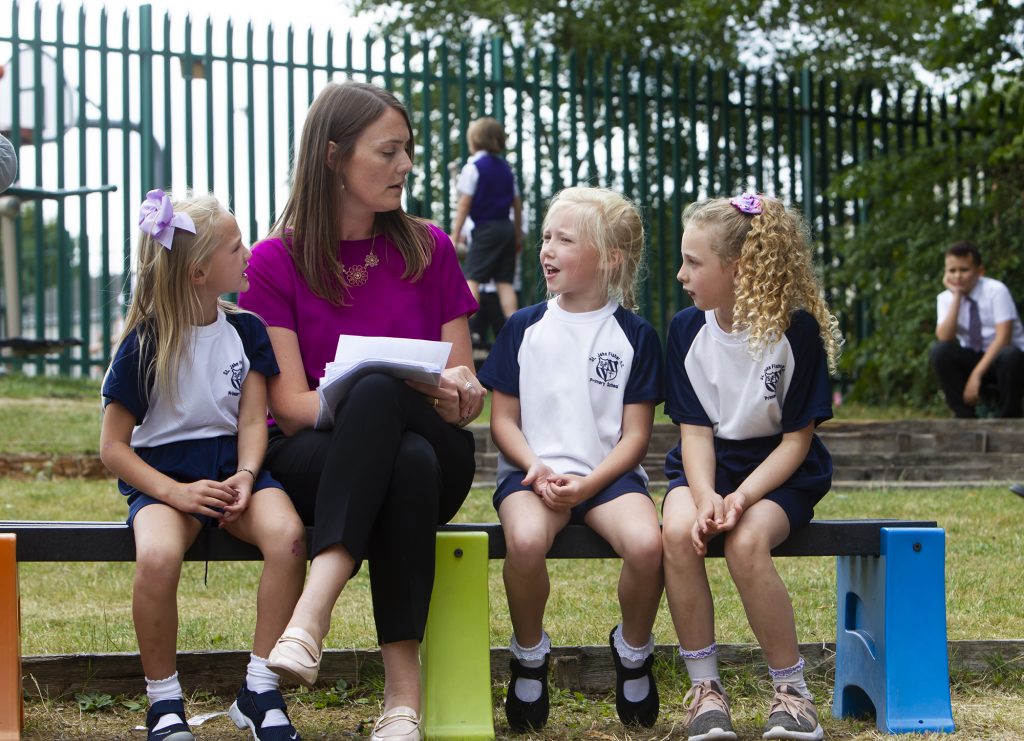For two days in June, the 10th annual Festival of Education brought together key thinkers in education, policy, mental health and wellbeing along with school staff and students from around the country to discuss and deliver talks on the latest research and opinion covering all things education.
This year, the festival was also host to the Wellbeing Summit, which featured a range of workshops, talks and panel discussions on the latest thinking and debate around wellbeing. The summit was curated by Cognita, a global school’s group, as a response to the pressing position of mental health and wellbeing on every school’s agenda. With half of mental health problems established by the age of 14, and 70% of children and adolescents who experience mental health problems not having had appropriate interventions at a sufficiently early age, primary schools are front and centre in the development of good mental health.
Mentally Healthy Schools, a legacy project of the Heads Together campaign, is a free website for primary schools, offering school staff, parents and carers information, advice and practical resources to better understand and promote pupils’ mental health and wellbeing. Mentally Healthy Schools, as a supporting partner of the Festival of Education, was highlighted as a case study of a digital resource that can support school staff in their own wellbeing as well as delivering mental health support for pupils.

At the Festival of Education, in a session called Sifting through the noise of wellbeing, Simon Camby, the director of Cognita, spoke about some of the main challenges that teachers face in delivering mental health support in their schools. He spoke about how Mentally Healthy Schools can help alleviate the pressure of these challenges through the following ways:
- giving teachers confidence and recognising that you don’t have to be a mental health expert to get it right
- making teachers’ jobs easier and more effective by providing trustworthy, grab-and-go resources ready to be delivered in classrooms
- offering evidence-based content and quality-assured resources that have been curated by the UK’s leading child mental health and education experts from Anna Freud National Centre for Children and Families, Place2Be and YoungMinds.
Another session led by Professor Jonathan Glazzard explored the impact of poor teacher mental health on pupils. After asking 60 primary age pupils about this, the children commented that they can immediately tell if their teacher is in a good or a bad mood. They also said that they can tell teachers get more stressed towards KS1 and KS2 exams. The study revealed that pupils don’t want to make their teacher’s mood worse so they stay quiet and don’t ask questions – this impacts negatively on their attainment.
Kate Norman, Sendco at Cholsey Primary School, noted the importance of good mental health as a basis for learning: “Mental Health and wellbeing needs to be right before we can expect children to learn.” Not only is poor teacher mental health bad for the teachers themselves, but it can be negatively impacting on the mental health and attainment of their pupils. Learn more on supporting staff wellbeing.

One of many eye-opening panel discussions was led by students themselves. They emphasised the need of an integrated approach to mental health, rather than just a ‘bolt-on’ part of the curriculum, mental health education should be part of a whole-school approach and the culture of the school. Find out more about a whole-school approach
So, what services or support do schools need to really get through to students?
There is no single, right answer – PSHE integrates mental health and wellbeing into the curriculum, normalising conversation within the classroom. However, students have also fed back that PSHE is not taken seriously because it isn’t delivered in a significant, wider context and, being grades-driven, students feel there isn’t something tangible to work towards.

There was also discussion around the effectiveness of having a single mental health lead in schools. This, however, can lead to overwhelming pressure on one person and moving away from a whole-school approach.
One student raised the importance of good sleep habits and their impact on wellbeing. Studies increasingly show the link between sleep and mental health and that children with less sleep are more likely to struggle with worries. Read more about good sleep hygiene.
Head to the Mentally Healthy Schools site now to explore all the resources it has to offer.



